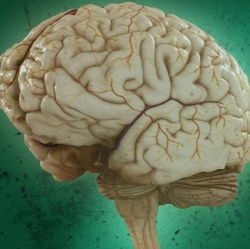
For decades, scientists have dreamed of building computer systems that could replicate the human brain’s talent for learning new tasks.
MIT researchers have now taken a major step toward that goal by designing a computer chip that mimics how the brain’s neurons adapt in response to new information. This phenomenon, known as plasticity, is believed to underlie many brain functions, including learning and memory.
With about 400 transistors, the silicon chip can simulate the activity of a single brain synapse — a connection between two neurons that allows information to flow from one to the other. The researchers anticipate this chip will help neuroscientists learn much more about how the brain works, and could also be used in neural prosthetic devices such as artificial retinas, says Chi-Sang Poon, a principal research scientist in the Harvard-MIT Division of Health Sciences and Technology.
Poon is the senior author of a paper describing the chip in the Proceedings of the National Academy of Sciences the week of Nov. 14. Guy Rachmuth, a former postdoc in Poon’s lab, is lead author of the paper. Other authors are Mark Bear, the Picower Professor of Neuroscience at MIT, and Harel Shouval of the University of Texas Medical School.
